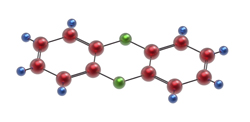Toxicity of industrial pollutants
Chlorinated dioxins, polychlorinated biphenyls and other dioxin-like compounds (DLCs) are common industrial pollutants that have known toxic effects in humans. Current toxicity tests for these compounds rely on out-dated markers of oral toxicity, and there are no measures of systemic toxicity available. The EU-funded SYSTEQ(opens in new window) project aimed to develop systemic toxic equivalencies (TEQs) to use in toxicological assessments, and to identify new biomarkers for toxicity. It also set out to define differences in TEQs between human and experimental animal species.A comparison between oral and systemic TEQs (which are based on the expression of several genes in response to a toxin) revealed that there is no major difference between systemic and oral toxicity for DLCs. As such, the research team concluded that the guidelines did not need updating. A comprehensive high-throughput screening process identified one new biomarker that could be used as a TEQ — a gene known as AHRR. This study also confirmed that the gene CYP1A1 remains the most useful biomarker for toxins in the body.Researchers also compared TEQ biomarkers between humans and various lab animal species. Overall, humans were less sensitive to DLCs than lab animals, suggesting that the sensitivity of TEQs based on animal studies have been overestimated. The SYSTEQ project made an important contribution to our understanding of DLC toxicity in humans. While the results suggest that toxicity has been generally overestimated for DLCs, this information will help to improve and refine the global standards for TEQs.



